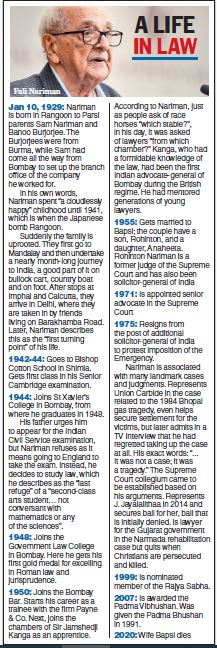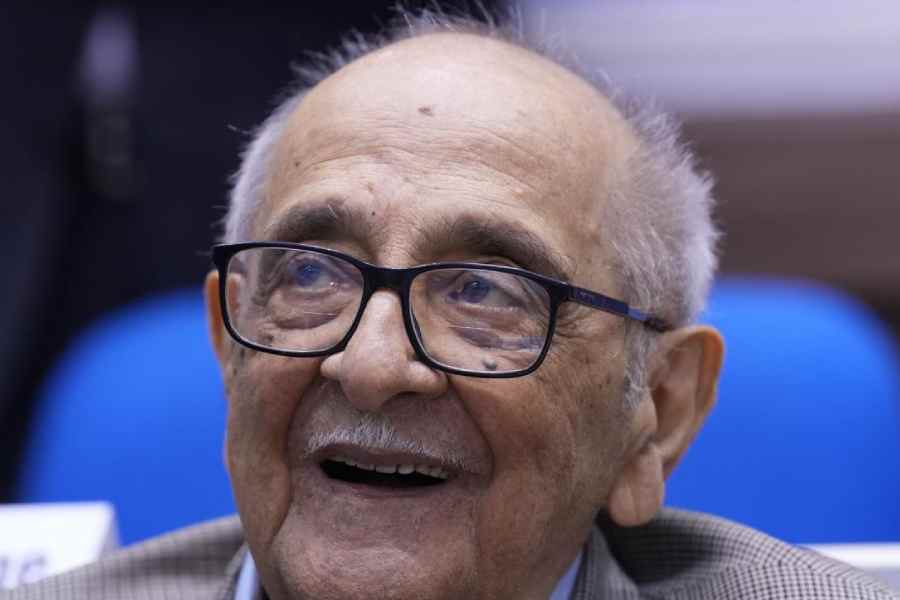I came to know Fali in the mid-seventies when he had moved to Delhi as an additional solicitor-general. He resigned from that post upon the declaration of the Emergency as a mark of protest; if memory serves me right, he did not go back to Bombay and stayed on in Delhi to pursue his profession.
Over the next many decades, he rose to be not only the leader of the Bar but the greatest lawyer of his generation and one of the greatest to have ever donned the robes in post-Independence India. I am woefully inadequate to attempt any serious assessment of Fali’s greatness as a lawyer and jurist. I am writing this piece in tribute and gratitude: for reasons best known to Fali, I have received unbounded (and undeserved) affection from him over the last 50-odd years. His death is a personal loss.
As a solicitor based in Calcutta, I briefed him as the arguing senior counsel in almost all my matters in the Supreme Court. But it was not always easy to convince him to accept all briefs. He was not known to be a person who was economical when it came to giving anyone a piece of his mind; often, a brief would be accepted only after the choicest words had been spoken both about the client and the merits of the
matter. Even in conferences, his berating of clients and lawyers alike was legendary — from “idiot” to “fatso”, anything could be hurled at anyone at any point during a conference.
It was virtually impossible for anyone to be prepared at a level that would be satisfactory to Fali: and his disappointment was always fully, unequivocally, and emphatically expressed.

Once, he was not happy with a note someone had handed over; so, Fali of course did the most natural thing: he flung it in no particular direction; the papers landed on a glass of water, which toppled, and the water flowed robustly onto a client’s lap. While the client (as gingerly as he possibly could) tried to get up and leave, Fali had already moved on to another point, expecting, of course, that everyone else would do the same without fussing over the incident.
While he could be gratuitous with his criticism when it came to his cases, his criticism of people and matters of public life was always balanced. Particularly when it came to judges, he may have criticised certain judgments, but I have never seen him criticise a judge.
To attend his conferences and work with him was to witness first-hand the process behind his brilliance. He could work for hours at a stretch and even at the end of the day, his mind would be as agile as when he had started — attending to each detail of a case with equal rigour. Just as no point was a “small point” for him in a matter, no case was a “small case”. His engagement with every matter was equal — it did not matter who the client was; the only thing that mattered was that, at the end of the day, he needed to have an answer to every point.
It was my great privilege that I had been associated with not only him but also with his wife Bapsi, whose legendary cakes have played no small role in my struggle with diabetes. She passed away a few years ago — every time I spoke to Fali after that, it was palpable how much he missed her. One of my life’s most treasured memories involves the two of them. At a party in Delhi to celebrate their wedding anniversary, the host had asked Fali how he would like to be seated. He wanted Bapsi on one side and me on the other. It was humbling; it was overwhelming; and I had done nothing to deserve such affection.
I last spoke to him on his birthday, on the 10th of January. When I asked him how he was doing, he said, displaying his characteristic wry wit, that one should never ask a man over 90 this question. He may have been over 90, but even on that day, which was only a few weeks ago, he was full of life and vigour — nothing could be more befitting than a man like Fali going with his boots on.
Avijit Deb is a Calcutta solicitor











